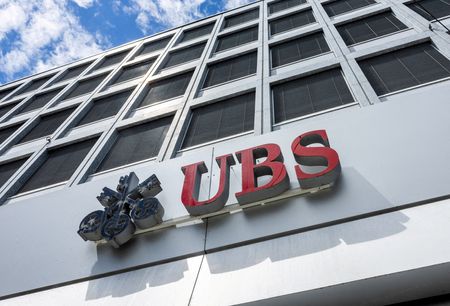By Ariane Luthi and Oliver Hirt
ZURICH (Reuters) -Switzerland and UBS are signalling in private a willingness to compromise on capital rules, potentially paving the way for parliament to settle on lower requirements acceptable to the government and the bank, according to people familiar with the situation.
UBS has strongly criticised the government’s proposed rules – unveiled in June to make the country’s banks safer following the 2023 collapse of Credit Suisse – because they would require it to hold $24 billion in additional capital.
The bank says that would put it at a disadvantage to global rivals, and is reviewing a series of mitigation strategies that even include relocating its headquarters abroad.
One person familiar with the government’s thinking told Reuters that Bern could be willing to accept rules that would likely lower the additional capital burden to somewhere around $15 billion. That is an amount UBS could tolerate, said two other people familiar with the bank’s thinking.
PROCESS STILL HAS A LONG WAY TO GO
All the sources underlined the process has a long way to go, and nothing is decided. Reuters could not establish whether UBS and the government had discussed possible concessions together. Representatives from both have been invited to a parliamentary committee meeting in early November.
Draft legislation will only next year reach parliament, which will ultimately decide the rules.
The finance ministry said the government was sticking to its proposals and had not signalled a willingness to reduce the additional capital burden to about $15 billion.
“The final decision will be made by parliament and, in the event of a referendum, by the people,” the ministry said.
UBS said it remained opposed to what it called an excessive increase in capital requirements and favoured “targeted, proportionate and internationally aligned” regulatory changes.
“We’re optimistic that a reasonable outcome can be achieved,” UBS added.
Newspaper Schweiz am Wochenende said at the weekend centrist and right of centre political parties were working on a compromise that pointed towards an extra capital burden of $10-15 billion.
“I am convinced that in the end we’ll get a result that ensures a better balance between stability and competitiveness,” said Roman Studer, CEO of the Swiss Bankers Association, based on discussions with banks, business leaders and lawmakers.
UBS FOREIGN UNITS AT HEART OF CAPITAL DEBATE
Much of the added capital burden centres on the government’s desire for UBS to capitalise its foreign subsidiaries to the tune of 100%, up from 60% now, a proposal due to reach parliament next year after a public consultation.
One lawmaker pushing for tougher regulation said, on condition of anonymity, that parliament could eventually meet in the middle, with the requirement lowered to 80%.
The source familiar with the government’s thinking said an 80% threshold could be acceptable to Bern.
Such a reduction would lower the extra capital needed close to $15 billion, two analysts who have crunched the numbers said.
Another route to ease the burden would be allowing UBS to cover part of it with so-called Additional Tier 1 (AT1) debt instead of Common Equity Tier 1 (CET1) capital as proposed.
UBS held around $19 billion in AT1 debt at the end of June. Incorporating that could lower the total add-on to a tolerable level for the bank, one source said.
“It must be possible to use AT1 as collateral,” SBA’s Studer said. “We should actually be able to agree on this.”
The parliamentary process means the final capital requirements will only become clear next year at the earliest.
UBS is under pressure from investors to find an acceptable solution. Its shares, while rallying in recent months, continue to lag peers this year.
One of its largest shareholders, activist investor Cevian, said this month the proposed rules would make UBS uncompetitive, even if watered down, and urged the bank to move abroad.
(Reporting by Ariane Luthi and Oliver Hirt. Additional reporting by Dave Graham. Editing by Tommy Reggiori Wilkes and Mark Potter)











